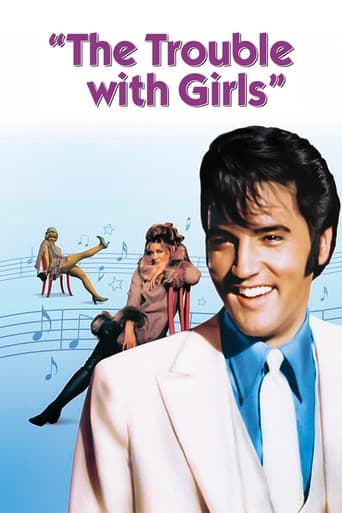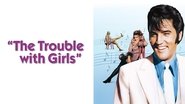bkoganbing
Except for a couple of westerns all of Elvis Presley's films were modern day movies. Only in this next to last film, The Trouble With Girls was Elvis in a period piece. In it he plays the manager in training of a Chautauqua show who gets involved in the business of a small town his show was playing in when one of his barkers Anthony Teague was accused of murder. The film takes place in 1927 and imagine Meredith Willson's small Iowa town from The Music Man as the location just a decade later and him deep in the Roaring Twenties. Presley is being trained by Edward Andrews to take over the show because Andrews wants to retire. Andrews and Presley clash over a difference in management styles probably due to a generational difference.There's only one girl that Elvis problems with, Marlyn Mason who wants to be involved with Elvis but not just romantically, she's organizing the Chautauqua performers for Actors Equity so we're talking labor/management issues as well. Into this Music Man setting a murder is committed, the deceased is Dabney Coleman without his familiar mustache. This was at the beginning of Coleman's career, but he's starting his very fine line of really smarmy human beings he's taken a patent out on in performing. He owns the local drugstore/ice cream parlor and he's not above taking advantage of people in all kinds of ways.Sheree North gives a nice performance as a single mom with a talented little daughter in Anissa Jones. And John Carradine as a ham actor and Vincent Price as a Chautauqua lecturer on morality make some great cameo appearances.Elvis does not do much in the way of singing in The Trouble With Girls. I really liked his number Preach In Your Own Backyard, but it really didn't fit in a Twenties setting. A decade earlier Presley revived the Al Jolson classic Are You Lonesome Tonight and Colonel Parker should have worked that one in for the King.Presley was coming to the end of his run as a film star and that's a pity because more people should have seen and appreciated The Trouble With Girls.
JoeKarlosi
One of the few of Elvis' last movies I'd never seen before, and kind of refreshing. The action takes place in 1927 and that setting looks and feels very much in the spirit of the period as Presely plays the cool manager of a traveling show, or a "Chautauqua". He tries to keep the show going on and the profits coming in, while all sorts of crazy situations present themselves, including a murder. There's quite a cast of characters on hand: Marlyn Mason is the union shop steward and piano player, Sheree North is the local town slut, Dabney Coleman plays a despicable gambling drug store merchant, and even Vincent Price and John Carradine get into the act as members of the troupe (Price is delightful as an energetic Philosopher, but Carradine not so much in a wasted quickie as a Shakespearean actor). Also featuring little Anissa Jones (Buffy from "Family Affair") and a quick singing turn by Susan Olsen (Cindy of "The Brady Bunch").The direction here is sometimes odd, but some handling of sequences are interesting. Elvis is solid in the film and really looks great if not a true reflection of the times, but the only song of note is his rather nifty rendition of "Clean Up Your Own Back Yard", one of the film's highlights. Someone really made a mistake in coming up with this extremely inappropriate title, though -- this is not one of Presley's typical formula films about girls, girls, and more girls ... it's misleading and doesn't do the movie justice. **1/2 out of ****
nigel77
The Trouble With Girls was much maligned on its original release in 1969.However it has a strong plot, excellent cast, interesting direction and very good use of camera angles (very unusual for an Elvis film). What a treat to see horror maestro, Vincent Price, in an Elvis film! There is also good chemistry between Elvis and leading lady, Marlyn Mason. The pacing is quite slow but this is one of the few Elvis films which can be viewed in "film critical" mode. Sadly, by the time The Trouble With Girls came out, both critics and the public had tired of Elvis films. Yet it together with Stay Away, Joe; Live A Little, Love A Little; Charro!; and Change of Habit were a positive step in redefining what Elvis' film career could have been.
Shane Paterson
I'd never really particularly liked this film mainly because it was nominally an Elvis movie but had Elvis pretty much co-starring in his own film. It's true that he doesn't get much screen time in this, his second-to-last scripted screen performance, but upon this screening I found that I enjoyed it more just as a film. The story is a little draggy, and fairly quirky, and this is a property that'd been shopped around for years before ending up as an Elvis Presley project.Chautauquas were popular traveling shows that, peaking around the turn of the century, brought to small towns lecturers and performers of all kinds. In "The Trouble With Girls" (weird title, more descriptive of some of his earlier '60s movies than this piece), Elvis plays the manager of a traveling Chautauqua troupe. They arrive by train in a small Iowa town and -- well -- trouble ensues. In reality, though, the trouble's mainly with the men. The film was originally titled "Chautauqua" but its name was changed because studio executives felt that nobody'd know what the heck a Chautauqua was. Didn't really matter much, anyway, because by 1969 Elvis' movies were finally not exactly packing them in and the unwieldy title "The Trouble With Girls (And How To Get Into It)" is hardly descriptive or indicative of the film's contents. Those who were still going to see Elvis' movies at the theater probably would've gone to see it if they'd titled it "Elvis Presley Movie #29," anyway.Elvis looks great in this film, with sideburns not only restored to full pre-Army glory (as they had been since late '67) but bigger and fuller than ever before. He does a fine job acting, even though his role is not as demanding as some he'd taken on if only because he was just one of an ensemble cast. It was quite a cast, too, including the likes of Vincent Price (great in a brief couple of bits as "Mister Morality") and John Carradine (only briefly seen, unfortunately -- conventional wisdom has it that this is the last film in which he and Vincent Price appeared together, though IMDB tells me that they co-starred in two more in the '80s). Dabney Coleman, ever-smarmy as a cheating druggist, is excellent as always and it's his character who ends up polarizing and driving the action forward on this rather lethargic property.But it's an Elvis movie, right? (well, sort of) So what about the songs? Well, because of the setting, all of the songs are realistic in presentation -- none of the typical musical's invisible orchestra -- and most of the Elvis tunes are further realistic in terms of their instrumentation. Elvis doesn't sing much in this film (1968's "Speedway," shot in the summer of 1967, was the last song-heavy Elvis film) but most of what he does is excellent stuff. The rousing traditional black gospel song, "Swing Down, Sweet Chariot" (a totally different song to the "Swing Low, Sweet Chariot" that most are familiar with) is done to perfection under the Chautauqua's big tent. Elvis had recorded this song back in 1960 and remade it for this film -- it was only the second of three 'religious' songs that Elvis did for the movies (the first was 1967's "Sing, You Children" from "Easy Come, Easy Go," and the third was "Let Us Pray" from 1969's "Change Of Habit"). Elvis also does a few lines of "Violet" during a medley of college fight songs (he also recorded "The Whiffenpoof Song" but, if it was included in the movie, it's missing from my copy) and he unveils a pretty and simple ballad, "Almost" near the movie's end. Along the way he and Marlyn Mason (no, not Marilyn Manson) duet on the Dixielandish "Signs Of The Zodiac," basically a novelty song. Elvis also does a song called "Clean Up Your Own Backyard," a song that pithily targets hypocrisy (small-town or big-city varieties) and that was as relevant to the situation in 1969, or today, as it was to the movie's central plot. The song is excellent and is heard here without the overdubbing that accompanied the single release. "Clean Up Your Own Back Yard" is easily among the very best of Elvis' movie songs and would have fit seamlessly within the body of work that he was laying down in the studio around this time, all of it of excellent quality (his legendary Memphis sessions of 1969 were just three or so months in the future when he made this film).This is not one of the classic Elvis films, even within the subgenre of Elvis' classic ‘60s musical films -- it's a drama-focused period piece in which Elvis is an underutilized part of an ensemble cast. It does, however, have some good scenes and some solid acting, though it wasn't about to give Butch and Sundance a run for their money at the box office. Elvis began production of this film a couple of months after taping the legendary 1968 TV Special and within a year would make headlines around the world as a result of his triumphant return to the concert stage. "The Trouble With Girls" was symptomatic of a Hollywood world that had palled in Elvis' mind and that would soon be totally irrelevant to who he was and who he was perceived to be. It's interesting, and has its moments, but it pales beside the real-life drama of Elvis in his element...performing live on stage. Still, for me, seeing Elvis do "Clean Up Your Own Back Yard" is, alone, reason enough to catch this rather odd film. And if you want to see Elvis in anything but ‘a typical Elvis Presley film,' this might be the movie for you. That is, if you can't find a copy or broadcast of "Flaming Star" or "Follow That Dream."




